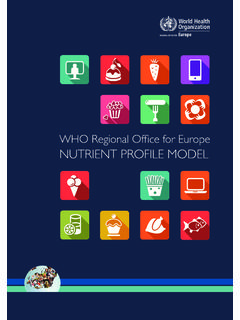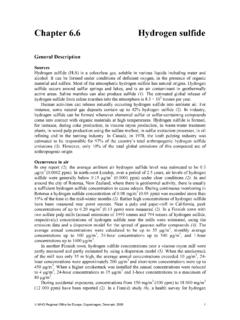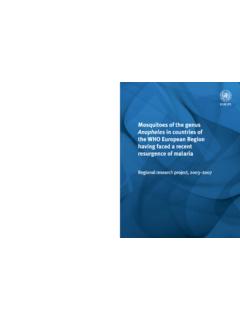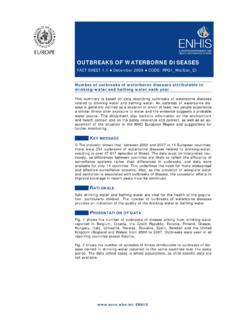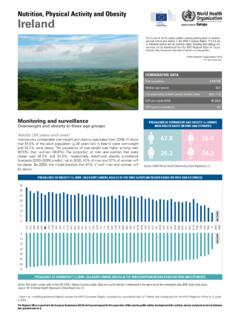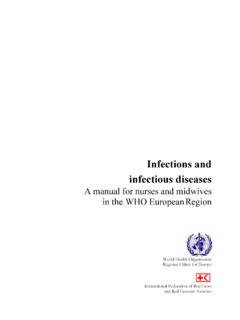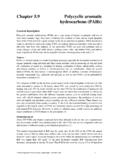Transcription of Environmentally sustainable health - World Health Organization
1 Environmentally sustainable Health systems: a strategic document Member StatesAlbaniaAndorraArmeniaAustriaAzerba ijanBelarusBelgiumBosnia and HerzegovinaBulgariaCroatiaCyprusCzech RepublicDenmarkEstoniaThe WHO Regional Office for Europe The World Health Organization (WHO) is a specialized agency of the United Nations created in 1948 with the primary responsibility for international Health matters and public Health . The WHO Regional Office for Europe is one of six regional offices throughout the World , each with its own programme geared to the particular Health conditions of the countries it Health OrganizationRegional Office for EuropeUN City, Marmorvej 51, DK-2100 Copenhagen , DenmarkTel.: +45 45 33 70 00 Fax: +45 45 33 70 01 Email: of MoldovaRomaniaRussian FederationSan MarinoSerbia SlovakiaSloveniaSpainSwedenSwitzerlandTa jikistanThe former Yugoslav Republic of MacedoniaTurkeyTurkmenistanUkraineUnited KingdomUzbekistanAddress requests about publications of the WHO Regional Office for Europe to: Publications WHO Regional Office for Europe UN City, Marmorvej 51 DK-2100 Copenhagen , DenmarkAlternatively, complete an online request form for documentation, Health information, or for permission to quote or translate, on the Regional Office website ( ).
2 PHOTO CREDITSC over: Shutterstock/ChinnapongThe map on the front page does not imply the expression of any opinion whatsoever on the part of WHO concerning the legal status of any country, territory, city or area or of its authorities or concerning the delimitation of its frontiers or : strategic document builds on the evidence that Health systems have a considerable environmental impact but that they can also have positive effects on the environment. A vision for an Environmentally sustainable Health system is put forth, as being a Health system that improves, maintains or restores Health , while minimizing negative impacts on the environment and leveraging opportunities to restore and improve it, to the benefit of the Health and well-being of current and future generations.
3 Ten avenues for action are proposed that can form the core of a strategy for fostering environmental sustainability in Health systems, namely adopting a national environmental sustainability policy for Health systems; minimizing and adequately managing waste and hazardous chemicals; promoting an efficient management of resources; promoting sustainable procurement ; reducing Health systems emissions of greenhouse gases and air pollution; prioritizing disease prevention, Health promotion and public Health services; engaging the Health workforce as an agent of sustainability; increasing community resilience and promoting local assets; creating incentives for change; and promoting innovative models of care. The WHO Regional Office for Europe encourages Member States to take an active role in environmental stewardship OF Health CAREENVIRONMENTAL HEALTHENVIRONMENTAL MONITORINGEUROPE World Health Organization 2017 All rights reserved.
4 The Regional Office for Europe of the World Health Organization welcomes requests for permission to reproduce or translate its publications, in part or in designations employed and the presentation of the material in this publication do not imply the expression of any opinion whatsoever on the part of the World Health Organization concerning the legal status of any country, territory, city or area or of its authorities, or concerning the delimitation of its frontiers or boundaries. Dotted lines on maps represent approximate border lines for which there may not yet be full mention of specific companies or of certain manufacturers products does not imply that they are endorsed or recommended by the World Health Organization in preference to others of a similar nature that are not mentioned.
5 Errors and omissions excepted, the names of proprietary products are distinguished by initial capital reasonable precautions have been taken by the World Health Organization to verify the information contained in this publication. However, the published material is being distributed without warranty of any kind, either express or implied. The responsibility for the interpretation and use of the material lies with the reader. In no event shall the World Health Organization be liable for damages arising from its use. The views expressed by authors, editors, or expert groups do not necessarily represent the decisions or the stated policy of the World Health .. ivAcknowledgements .. ivAbbreviations .. ivExecutive Summary .. vIntroduction.
6 1 Vision .. 3 The knowledge base on environmental sustainability in Health systems .. 4 Environmental impacts and pressures .. 5 Opportunities and benefits .. 6 Enablers and barriers .. 7 Knowledge gaps .. 8 Key types of environmental sustainability actions .. 9 Overarching action: adopting a national environmental sustainability policy for Health systems .. 9 Minimizing and adequately managing waste and hazardous chemicals .. 10 Promoting an efficient management of resources .. 10 Promoting sustainable procurement .. 11 Reducing Health systems emissions of greenhouse gases and air pollution .. 12 Prioritizing disease prevention, Health promotion and public Health services.
7 12 Engaging the Health workforce as an agent of sustainability .. 13 Increasing community resilience and promoting local assets .. 13 Creating incentives for change .. 14 Promoting innovative models of care .. 14 Managing change .. 15 Next steps .. 16 References .. 17ivEnvironmentally sustainable Health systems: a strategic document WHO Regional Office for EuropeFOREWORDH ealth systems are fundamental to achieving and maintaining societal Health and welfare, and are key factors for development and economic growth. They also represent a large share of the economy, globally and in most Member States of the WHO European Region, and employ large workforces, notably in Health care. Taken as a whole, the Health sector consumes considerable amounts of energy and resources and produces major streams of emissions and waste, either directly or through the goods and services it procures, uses and disposes of.
8 Ideally, an Environmentally sustainable Health system improves, maintains or restores Health , while minimizing negative impacts on the environment and leveraging opportunities to restore and improve it, to the benefit of the Health and well-being of current and future generations. Actions in stewardship, service delivery, resource generation and financing can contribute to these WHO Regional Office for Europe has a clear policy mandate in this area. Health 2020, the Tallinn Charter: Health Systems for Health and Wealth, and the Parma Commitment to Act on Environment and Health provide a solid basis upon which to engage in technical work, advocacy and support to Member States in policy development, adoption and document proposes a range of practical actions that can help Member States to further strengthen Environmentally sustainable Health This draft document was developed jointly by the Division of Health Systems and Public Health and the Division of Policy and Governance for Health and Well-being of the WHO Regional Office for Europe.
9 It was written collaboratively by Gerardo Sanchez Martinez, Martin Krayer von Krauss, Bettina Menne and Govin Permanand. Its development was coordinated by Elizabet Paunovic and Hans Kluge. The Regional Office acknowledges contributions from several additional programme managers and technical officers, in particular Oliver Schmoll, Dorota Jarosinska, Elke Jakubowski, Enkhee Shinee, Francesca Racioppi, Srdan Matic, Hanne Bak Pedersen, Juan Tello, Marco Martuzzi, Marie Eve Heroux, Matthias Braubach, Sarah Thomson, and Tamas Evetovits, and from external contributors, in particular Sonia Roschnik and James Mackenzie ( sustainable Development Unit, National Health Service, England, United Kingdom) and Fiona Adshead (Bupa, United Kingdom).ABBREVIATIONSEDC Endocrine-disrupting chemicalESHS Environmentally sustainable Health systemsEU European UnionNHS National Health Service, England, United KingdomUNEP United Nations Environment ProgrammeUNFCCC United Nations Framework Convention on Climate ChangeWASH Water, sanitation and hygieneWHA World Health AssemblyWHO World Health OrganizationvEXECUTIVE SUMMARYH ealth systems are fundamental to achieving and maintaining societal Health and welfare, and are key factors for development and economic growth.
10 They also represent a large share of the economy in most Member States of the WHO European Region, and employ large workforces, notably in Health care. Due to its size and processes, the Health sector as a whole consumes considerable amounts of energy and resources and produces major streams of emissions and waste, either directly or through the goods and services it procures, uses and disposes of. This entails direct and indirect environmental impacts, which have traditionally been addressed through compliance with increasing regulatory demands. However, more and more frequently, the Health sector in many Member States is taking an active role in environmental stewardship efforts. This proactive stance is supported by various facts: 1) several environmental sustainability interventions can support the tackling of upstream determinants of Health ; 2) environmental sustainability action can provide benefits for patients, providers, the Health workforce and Health systems core functions, and can also decrease environmental Health risks; and 3) environmental sustainability can help reduce costs and increase the resilience of Health systems.

